Current News
/ArcaMax

Ukraine rejects claim Russian forces enter key central region
Kyiv’s armed forces rejected as “disinformation” Russia’s claim that its ground troops have crossed into Ukraine’s Dnipropetrovsk region for the first time, even as prospects for a U.S.-brokered ceasefire remain elusive.
Separately, Ukraine and Russia continued testy exchanges over the details of a planned large prisoner swap agreed ...Read more
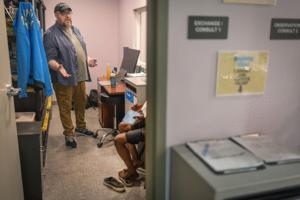
Meth makes comeback in Minnesota in more dangerous and record ways
MINNEAPOLIS — A subtle shift was happening among clients at the north Minneapolis community drop-in center.
For years, people seeking substance abuse services at Anything Helps reported using just one drug of choice. Recently, staff noticed more and more users had expanded their appetite, preferring a combination of drugs at once versus “...Read more

Corporations pull back from LGBTQ Pride sponsorships, affecting South Florida events
FORT LAUDERDALE, Fla. — The LGBTQ Pride month parades and festivals will go on.
But in the current political environment, organizers of the events in South Florida and across the nation are feeling pressure.
Hostility from President Donald Trump’s administration toward anything touching on diversity, equity and inclusion is having an ...Read more

Two patients faced chemo. The one who survived demanded a test to see if it was safe
JoEllen Zembruski-Ruple, while in the care of New York City’s renowned Memorial Sloan Kettering Cancer Center, swallowed the first three chemotherapy pills to treat her squamous cell carcinoma on Jan. 29, her family members said. They didn’t realize the drug could kill her.
Six days later, Zembruski-Ruple went to Sloan Kettering’s urgent ...Read more
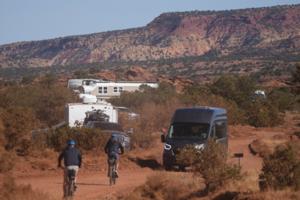
Long-thwarted efforts to sell public lands see new life under Trump
Public outcry was swift and forceful after a U.S. House committee last month hastily approved an amendment directing the federal government to sell off more than half a million acres of public land.
A few days later, lawmakers advanced the larger bill — a sweeping list of President Donald Trump’s priorities — but stripped the federal ...Read more

'It felt different': US citizens arriving in Miami report tense encounters with Customs
MIAMI — In January, a man returning to the United States from Nicaragua landed at Miami International Airport, made it through customs and waited for his luggage at baggage claim. By the time he left the airport, U.S. Customs and Border Protection officials had revoked his Global Entry status.
In April, a social-media travel-content creator ...Read more

Colombia candidate fighting for life after assassination bid
Surgeons are operating on Colombian presidential candidate Miguel Uribe Turbay after an assassination attempt that recalled the political violence that roiled the nation in the 1980s and 1990s.
Uribe’s wife said the 39-year-old opposition senator is “fighting for his life” following the attack, which happened while he was campaigning in a...Read more
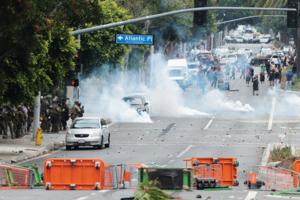
2,000 National Guard troops will be sent to LA amid clashes over immigration raids
LOS ANGELES — The Trump administration said it would send 2,000 National Guard troops into Los Angeles after a second day in which protesters confronted immigration agents during raids of local businesses.
The move marks a major escalation in Trump’s crackdown on illegal immigration and came amid concerns from some officials in California. ...Read more

Colombian presidential candidate Miguel Uribe shot in Bogota
Colombian presidential candidate Miguel Uribe Turbay was shot at a campaign event in Bogota on Saturday in an act reminiscent of the drug-fueled political violence that roiled the nation in the 1980s and early 1990s.
The 39-year old senator from the opposition Democratic Center party was rushed to a medical center. He was stabilized there ...Read more

Protesters decrying ICE arrests taken into custody in lower Manhattan
NEW YORK — Multiple demonstrators were taken into custody Saturday afternoon during a protest against Immigration and Customs enforcement in Lower Manhattan in response to ongoing migrant arrests this week.
Cops responded to outside immigration court around noon at 26 Federal Plaza where protesters were sitting in the middle of the street ...Read more

Colombian presidential candidate Miguel Uribe shot in Bogota
Colombian senator and presidential candidate Miguel Uribe Turbay was shot at an event in Bogota, with his condition still unclear.
The 39-year-old candidate from the opposition Centro Democratico party was taken to a medical center in the Colombian capital, Semana reported. Online footage of the shooting showed Uribe’s head and back covered ...Read more

Bottlenose dolphin born at Brookfield Zoo Chicago, takes its first breath on video
CHICAGO — A bottlenose dolphin safely delivered a calf early Saturday morning at Brookfield Zoo Chicago, a “momentous occasion” that marks the first dolphin birth in more than a decade at the west suburban zoo.
Allie, a 38-year-old bottlenose dolphin and experienced mother of four, gave birth to the calf — which will be named later ...Read more
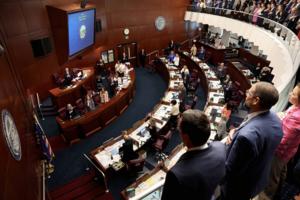
2025 Nevada Legislature wraps with bitter taste, observers say
LAS VEGAS — It’s not a good sign in Carson City when members of your own party vote down your bill.
But with less than two hours left in the Nevada Legislature’s 83rd session, a new version of Gov. Joe Lombardo’s landmark health care proposal — heavily amended by Democrats in the state Senate — left Republicans with little choice ...Read more
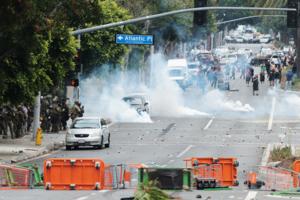
After 2 days of clashes over immigration raids, National Guard will be sent to LA, official says
LOS ANGELES — A Trump administration official said National Guard troops would be sent into Los Angeles after a second day in which protesters confronted immigration agents during raids of local businesses.
Around 4 p.m. Saturday, a crowd gathered in Paramount in a chaotic clash with federal agents were ordered to disperse. An unlawful ...Read more

LA Mayor Karen Bass says she has reached a deal to restore police officer hiring
LOS ANGELES — Los Angeles Mayor Karen Bass has reached an agreement with City Council President Marqueece Harris-Dawson to find the money to reverse the cuts to police hiring made last month by the council.
On Friday, Bass signed the 2025-26 budget approved by the council, which reworked much of her plan for closing a $1-billion shortfall. ...Read more
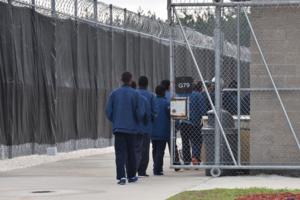
South Georgia officials greenlight creation of nation's largest ICE jail
ATLANTA — South Georgia could soon be home to the country’s largest immigrant jail.
Local officials approved a plan this week to markedly increase capacity at the Immigration and Customs Enforcement facility located in Charlton County, called the Folkston ICE Processing Center.
Sitting fewer than 10 miles from the Florida border, the ...Read more

China approves some exports of rare earths ahead of US talks
Beijing says it granted approval to some applications for the export of rare earths, a move that could ease tensions before trade negotiations between the U.S. and China next week.
The Chinese commerce ministry confirmed the approval of the applications without specifying which countries or industries were covered, even as it noted growing ...Read more

Jobs at the Port of Los Angeles are down by half, executive director says
LOS ANGELES — Job opportunities at the Port of Los Angeles are dwindling as President Donald Trump's steep tariffs take a hit on global trade and a major economic engine for the regional economy.
Nearly half of the longshoremen who support operations at the port went without work over the last two weeks, Gene Seroka, executive director of the...Read more
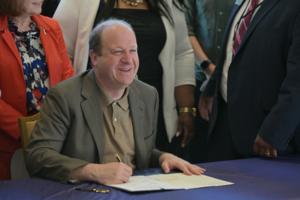
Gov. Jared Polis sets personal record for vetoes -- with grumbles from fellow Colorado Democrats
DENVER — Gov. Jared Polis set a personal record for issuing vetoes in a single legislative session this year — and, potentially, made history as the first Colorado governor to veto a bill that passed the General Assembly unanimously.
The 11 vetoed bills touched on a raft of issues: social media regulations, new rules for ride-hailing ...Read more
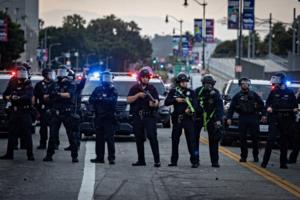
Immigration raids roil LA, dozens of people detained. What we know so far
LOS ANGELES — Immigration raids Friday led to the arrests of dozens of people and caused hours of chaos in downtown L.A.
Here is what we know so far:
Where were the raids?
Federal agents hit several locations including the Ambiance Apparel in garment district, where many were detained and authorities clashed with protesters, and a Home ...Read more
Popular Stories
- 'Eerie similarities': Democrats who were tea-partied in 2010 say today's GOP faces own reckoning
- Rifles, stun grenades, armored trucks in ICE raids spur tensions
- Two patients faced chemo. The one who survived demanded a test to see if it was safe
- Meth makes comeback in Minnesota in more dangerous and record ways
- Inspectors find long list of problems at troubled Kentucky youth detention center





